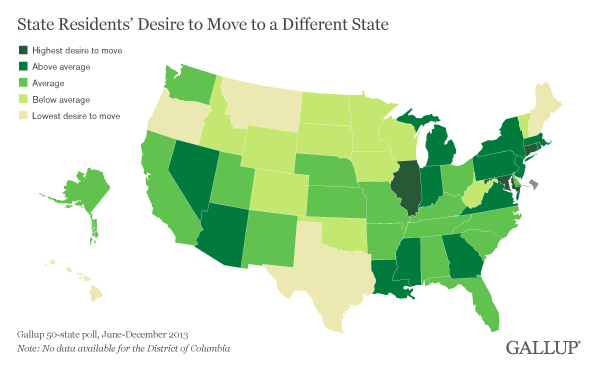In a survey they might as well have subtitled "The Grass is Always Greener," Gallup found that about a third of Americans would, if given the opportunity, pick a different state in which to live. Even in those states where the largest percentage of residents were satisfied to stay put, almost a quarter would leave if they could.
In three states nearly as many people want to leave as want to stay. Fifty percent of those surveyed in Illinois indicated a desire to move as did 49 percent in Connecticut and 47 percent in Maryland. Other states where at least four out of ten residents felt they would be happier elsewhere included Nevada, Rhode Island, New Jersey, New York, Massachusetts, and Louisiana.
In contrast only 23 percent of residents of Montana, Hawaii, and Maine expressed a desire to move, closely followed by Oregon, New Hampshire, and Texas with 24 percent and Colorado and Minnesota with 25 percent.
In the survey conducted over the last six months of 2013, Gallup asked respondents, "Regardless of whether you will move, if you had the opportunity, would you like to move to another state, or would you rather remain in your current state?"

Gallup also asked how likely it was that respondents would move in the next 12 months. An average of 6 percent of residents said it was extremely or very likely they would relocate within a year and 8 percent said it was somewhat likely. Seventy-three percent said such a move was not likely at all and 14 percent said it was not too likely. Those who indicated any degree of likelihood of moving were asked an open-ended question as to why. While the sample size was small, the most frequent reason cited was for work or business, a nationwide average of 31 percent. Nineteen percent of respondents indicated any move would be related to family or social reasons while weather or location was given by 11 percent and a better quality of life or desiring change by 9 percent.
Gallup said that state leaders have important reasons for wanting continued population growth; more commerce, economic vitality, and a larger tax base. A shrinking population not only presents less healthy economic possibilities but can mean a loss of political clout through reduced Congressional representation. The company says its poll finds some states "far better positioned than others to retain residents, and thus possibly attract new ones." Not only is there a wide variation in the percentage of residents who say they would leave if they could, but when responses about the likelihood of a move within the year are combined, other danger signals flash.
Gallup finds that Nevada, Illinois, Maryland, Louisiana, Mississippi, New York, and Connecticut appear particularly vulnerable to losing population in the coming few years. High percentages of residents say they would leave and larger than average numbers indicate some likelihood of actually doing so. However, Texas, Minnesota, and Maine have little to fear. Residents of these states are among the least likely to want to leave and few are planning on it in the next 12 months.
Gallup notes that it has conducted three other 50-state polls measuring resident satisfaction with state taxes, state government, and perceptions of how the resident's state compares to others as a place to live. Texas has ranked in the top ten in all three while Illinois, Rhode Island, and Maryland were near the bottom in each.







